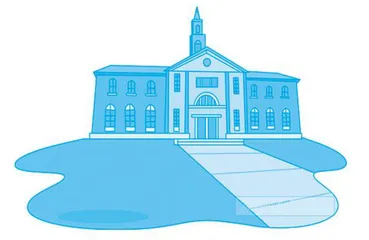Elite Universities Are Out of Touch精英大学与社会脱节
作者: 尼克·伯恩斯 丁婷/译

Looking out the window of a plane flying over Boulder, Colorado, recently, I was reminded how much American universities stick out from their surroundings.
最近,我乘飞机飞过科罗拉多州博尔德县上空。透过舷窗向外望去,我不禁意识到,美国的大学在周边环境的映衬下竟是如此醒目。
I’d never been to Boulder, or visited the University of Colorado’s flagship campus there, but even from 30,000 feet, I could tell exactly where it started and ended. The red-tile roofs and quadrangles of the campus formed a little self-contained world, totally distinct from the grid of single-family homes1 that surrounded it.
我从未去过博尔德县,也没有参观过科罗拉多大学的这座主校区,可即便是从三万英尺的高度俯瞰,我照样能准确辨别校区边界。红瓦屋顶与方形校园自成一体,构成了与周边网格化的独户式住宅截然不同的小世界。
In urban universities2, the dividing line between the campus and the community can be even starker. At the University of Southern California, for example, students must check in with security officers when entering the gates of the university at night. At Yale, castle- like architecture makes the campus feel like a fortified3 enclave4. The elite American university today is a paradox: Even as concerns about social justice continue to preoccupy students and administrations, these universities often seem to be out of touch with the society they claim to care so much about. Many on the right and in the center believe universities have become ideological echo chambers5. Some on the left see them as “sepulchers6 for radical thought.”
在市区大学,校园与社区之间的界线会更加分明。比如在南加利福尼亚大学,学生夜间入校时必须在安保人员处登记。在耶鲁,城堡造型的建筑让校园看上去像是筑有防御工事的飞地。今天的美国精英大学本身就自相矛盾:尽管学生和学校管理部门始终专注社会公正问题,这些大学却往往与其声称甚为关注的社会相脱节。许多右翼和中间派认为,大学已成为附和意识形态的“回音室”,而左翼一些观点则将大学视为“埋葬激进思想的坟墓”。
Public debate over the state of higher education has intensified in recent years. Ideology and institutional culture get frequent attention, but a key factor is often ignored: geography.
近年来,关于高等教育现状的公开辩论愈发激烈。意识形态和机构文化屡受关注,但地理这一关键因素却常被忽略。
The campus is a uniquely American invention. (The term originated in the late 1700s to describe Princeton.) Efforts to create separate environments for scholars came about at a time when elite American opinion was convinced that cities were hotbeds of moral corruption. Keeping students in rural areas and on self-contained campuses, it was thought, would protect their virtue.
校园是美国特有的产物。(该词最早见于18世纪末,用来形容普林斯顿大学。)美国精英派一度坚信,城市是滋生道德腐化的温床,于是便着手为学者打造独立的环境。人们认为,将学生安置在乡村地区自成一体的校园里,可以保护他们的德行。
Though such ideas have lost their appeal in recent years, to this day American universities are radically more isolated from their surrounding communities than their European counterparts are. And being situated around a strongly defined central campus, often featuring trademark Gothic-style architecture, remains a point of pride for elite American universities.
尽管此类观点近年来已失去热度,时至今日,与欧洲大学相比,美国的大学从根本上讲更脱离周边社区。轮廓分明的中心校区往往以标志性的哥特式建筑为特色,这一直是美国精英大学引以为傲之处。
But the campus, by design, restricts opportunities to encounter people from a wider range of professions, education levels and class backgrounds. Of course, students like to spend time with other students, and scholars associate with other scholars. And that’s good for education and research. But there’s no need to enforce a geographical separation from society on top of it.
然而,校园从设计上就限制了拓展交际圈的机会,妨碍结识不同职业、学历和阶层背景的群体。当然,学生喜欢与其他学生在一起,学者愿意同其他学者交往,这有利于开展教育和研究,但没必要在此基础上再强加一条地理界线,把校园与社会分隔开。
We all instinctively extrapolate7 insights from our own communities and day-to-day interactions, imagining they are true about the nation at large. Inevitably, that means our view of the country is a little distorted—but for those in the university, the distortions can be extreme. Stuck on campus, academics risk limiting their knowledge and toleration of a wider sweep of American society.
我们都本能地基于自己所在的社区和日常交往做出推断,觉得自己洞察到的就是整个国家的真貌,这不可避免地意味着我们对国家的看法略微失真。可对于那些身处大学的人而言,这种失真可能会达到极点。学者们被束缚在校园内,对更大范围的美国社会的了解和容忍度会受限。
To put it another way, what’s most dangerous for the health of America’s intellectual elite is not that most professors have similar cultural tastes and similar liberal politics. That will probably always be the case. It’s that the campus setup makes it easy for them to forget that reasonable people often don’t share their outlook.
换言之,就美国知识精英的现状而言,最大的危险并非大多数大学教师拥有趋同的文化品味和类似的自由主义政治观。这种情况可能会一直如此。最大的危险在于,校园的建构让他们易于忘记:有识之士往往不同意他们的观点。
The highly educated are far more liberal than average Americans. The divide isn’t just political: Whatever their socioeconomic backgrounds, students and professors have daily routines that are very different from those of lawyers, shopkeepers or manual laborers—and that shapes their worldviews.
高学历者远比普通美国百姓更具自由主义倾向。差异不仅限于政治层面。无论大学师生的社会经济背景如何,他们的日常生活与律师、店主或体力劳动者截然不同——这便塑造了他们的世界观。
Life at a university with a dominant central campus can also narrow students’ views on the world. Letting the university take care of all of students’ needs—food, housing, health care, policing, punishing misbehavior—can be infantilizing for young adults. Worse, it warps8 students’ political thinking to eat food that simply materializes in front of them and live in residence halls that others keep clean.
在一座拥有主导性中心校区的大学里生活还可能让学生的世界观变得狭隘。大学包揽了学生的全部需求,比如饮食、住宿、就医、治安、惩戒等,这会让年轻人变成“巨婴”。更糟糕的是,吃的东西有人端到面前,住的宿舍有人负责打扫,这扭曲了学生的政治观念。